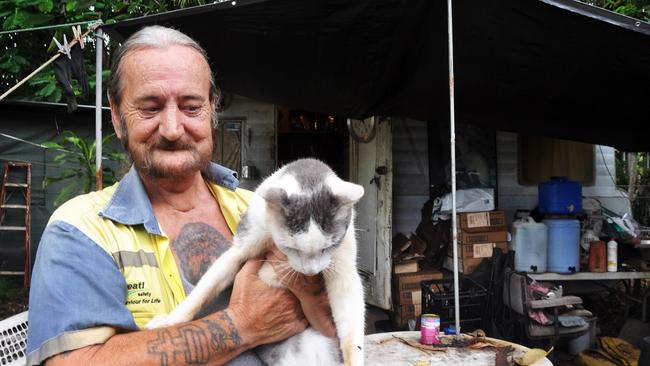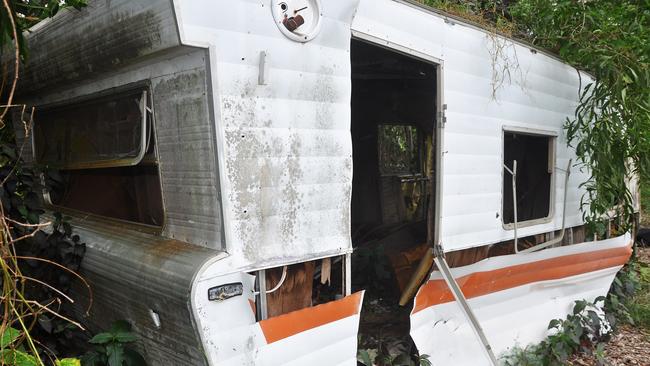IN the far corner of a grassy back block at Humpty Doo sits the warped carcass of “Stinky” Bill Mason’s caravan, a grim monument to the day, twenty years ago on Monday, that evil come to visit.
The mystery of how Mason’s life came to an end — in a shallow bush grave in the grassy scrubland in the shadow of the Humpty Doo water tower — lingers as a grim bookend to the life of a man who never spoke much about his past and whose birth certificate authorities could never find.
But every now and then over a beer in the evening, the cheery down-and-outers who live in the caravan park behind the Bush Shop, where Mason spent his final years, tell the story of when Mason disappeared, twenty years ago tomorrow.
In the caravan park, seemingly forgotten by time, many remember his death as if it happened weeks rather than decades ago.
Bush Shop owner Peter Puljic, who still spends many of his days pottering around the caravan park, remembers the heavy atmosphere that took over the park in the month between when Mason disappeared and when police found his body.
When Mason went missing on March 19, 1998, Mr Puljic, like many others, noticed the disappearance immediately.
But it was only when police found Mason’s body buried in a shallow grave among the grassy scrub a short walk from the shop that his disappearance started to make sense.
“He was nice to me, polite to me and all that, but a bit aggressive to some people (who were) killing cats and all that. To them he would get aggressive,” he said of Mason in his thick Croatian accent and broken English.
“I remember they found his body down back.
“I can’t believe it, pretty wild.”

***
After police were done digging up Mason’s body, interviewing dozens of locals, and sorting through his hoarded piles of newspapers and rubbish for some scrap of forensic evidence, Mr Puljic and some mates pushed Mason’s already half-rotten old caravan up the back against the fence, where it still sits among the weeds, beside a rusted old Mercedes Benz.
Mason’s death gradually went from being a white-hot murder investigation — on the front page of the NT News for three days straight and at the top the Channel 8 news — to being among the Territory’s most baffling unsolved police investigation.
While some people’s memories of Mason have faded, the old timers living behind the Bush Shop tell the same story of Mason’s disappearance as if it were indisputable truth.
But like many of the stories that get told again and again around the caravan park, the story of Mason’s disappearance is tinged with an element of “she said she told so-and-so who told so-and-so who told so-and-so”, a problem which has for two decades confronted every investigator who has tried to prove how Mason died.
Everyone willing to speak to the NT News about Mason’s disappearance questioned the behaviour of a group of teenage boys at the time ...”
***
Tony Thomson, who has lived at the caravan park for 17 years and who remembered occasionally seeing Mason on the bus before he died, said there were “some pretty terrible people living here years ago”.
“It still gets talked about, a lot of people are still around, especially the older people,” he said.
Mr Thomson, said it was time, twenty years on, for the people who know first-hand what happened to Mason to “actually say something to someone, or if they’ve got a conscience, go into the cop shop.”
“Them kids, well, now they’re men, if it was them kids (who killed Mason).”
Surrounding the central unanswered question in the investigation into Mason’s death are other “loose ends”.
A shovel thought to be used to dig Mason’s grave and a garbage bin into which his body was likely stuffed before being buried, were also never found, despite extensive searches at the time.

Police ruled out Mason having been robbed within hours after he disappeared, but the respected officer in charge of the investigation, Detective Sergeant Greg Lade, told the inquest some of Mason’s most prized possessions were never found — a leather bag in which he kept his important papers, a stethoscope and a pair of drumsticks he often tucked into his socks.
A retired detective familiar with the case, who asked not to be named, said it left open the possibility that Mason’s killer could have stolen, or at least made a grim souvenir of some of Mason’s most prized trinkets.
Coroners Court and police records also show no sign of any of a group of boys at the centre of the police investigation being questioned over the three VB stubbies found in Mason’s grave, despite two of them showing up to Ian Panchaud’s converted bus at the Coolalinga Caravan Park the day Mason’s body was found with a cans of the same beer.
“(It) was most unusual,” Mr Panchaud told the inquest, “cause these were blokes that sort of never really came round to my place for any drinking or anything like that.
“That was the first thing that was strange.”
The former detective said such “loose ends” in unsolved cases were the kinds of questions that “keep old coppers up at night”, whether they were a simple coincidence or not.
***
The thought of Mason’s presumably gruesome final moments alive still haunt those who were closest to him. Perri Kirby, who last saw Mason the day or so before he disappeared, said this week one of her biggest regrets was not being able to stop and listen to him talk about the troubles he had been having with the boys at the caravan park killing his cats.
“He’d had trouble with two boys out there ... I was in such a hurry to get back home and I said, ‘tell me about it tomorrow Bill’, and he never did,” she said.
Ms Kirby said she and her sister, Tracy Brown, were the closest thing Mason had to family.
“He wasn’t a well man but he was a proud man,” she said.
“I’d take him to the casino and I sat there with all my gold and pearls on, and we sat there and had a beer and I thought we would have been a sight for all to see.”
She said police should revisit the investigation into Mason’s death, which she thought took crucial missteps in its first few days.

“I forget his name, but (a police officer) rang me at home and told me that Billy Mason had been missing, had I any idea where he was,” she said.
“They rang me and I said he would never have left town, and one of the coppers said ‘did he go to such and such a place?’ and I said ‘no, he wouldn’t have gone without saying goodbye’.
“The fact is he was already dead.
“Whether they meant to kill him or not, to put him in that wheels bin tells me you’ve got serious issues.
“I can recall being told a mention of (suspects), and they knew that they did it but they didn’t have the evidence to prosecute or proceed against them.”
To this day, despite frequent trips back to Darwin to visit family and friends, Ms Kirby has never had the stomach, to drive out to Humpty Doo and peek over the fence behind the Bush Shop, where what’s left of Mason’s caravan sits.
“We genuinely liked the old man ... the fact is there are people out there who shouldn’t be walking free.”

Add your comment to this story
To join the conversation, please log in. Don't have an account? Register
Join the conversation, you are commenting as Logout
Mental health advocate uses personal pain as strength
The award-winning mental health facilitator and advocate is passionate about breaking cycles of violence and is not afraid to use her own painful story to do it.
Unpacked: The Kumanjayi Walker coronial inquest findings
After almost three years since it began, the inquest into the death of Kumanjayi Walker has finished. So, what did Coroner Elisabeth Armitage find out – and will it bring change?